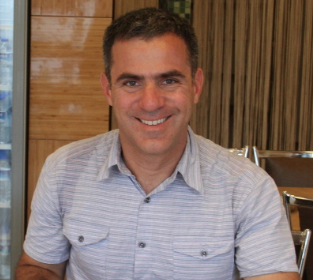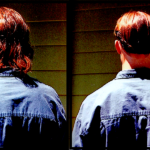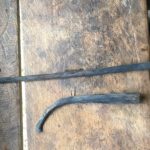Seth Kugel writes the Frugal Traveler column for the New York Times. Not a lifelong travel writer, he has been a public school teacher in the Bronx, an immigrant services provider, a municipal bureaucrat, a stringer for the City section of the New York Times, and the Brazil correspondent for GlobalPost.com.
How did you get started traveling?
As soon as my parents thought my brother and me were old enough appreciate traveling, off we went. When I was 11 we spend the summer in London, which I thought was extraordinarily exotic, though now I’m more likely to be astonished by how much more it is like the United States than just about anywhere else. I loved it from the outset, but my first foray into “frugal” travel really changed how I wanted to travel. As a 15 year-old, when I went on a YMCA exchange program to Kenya and did the whole live-in-a-village, do-a-work-project thing. Despite coming home with Hepatitis A (that’s the feces-in-the-drinking-water kind), it was obvious to me that was the right kind of travel: uncomfortable and life-changing. After I graduated from college, but before I wrote my first travel piece, I basically spent every vacation I had in Latin America honing my Spanish, Portuguese, and frugal travel skills. Most of the time I was visiting relatives of Latin American immigrants I knew in New York, which left me with an ability to sleep in very uncomfortable places and a distaste trips that do not include time in people’s homes.
How did you get started writing?
I wrote goofy columns in my high school and college newspapers (the columns’ names were “A Piece of Kugel” and “Chewing the Cud”, but they were more humor columns than legitimate journalism. But at age 28, a friend suggested I take a “how to get published” course in New York. By the end of the class (still taught by Susan Shapiro at The New School) I had sold pieces to the New York Times, Time Out: New York and Playboy.
What do you consider your first “break” as a writer?
Not sure that this counts as a break, but at the precise time I broke into those publications — 1999 — media was just catching on to the importance of covering Latinos. I had just spent about seven years working in Latino neighborhoods in New York City. That’s enough time to accumulate a lot of story ideas. I pitched a ton of those to the Times, and had to learn to be a reporter on the fly (and as a side job). By 2001, I quit my day job and was mostly just freelancing for the Times.
As a traveler and fact/story gatherer, what is your biggest challenge on the road?
It’s trying to stir things up, make things happen. I’m not a sights-and-museums-and-hotels-and-restaurants travel writer — those are the nuts and bolts of travel writing, but make for boring copy. So I need to meet strangers, have funny conversations, learn odd facts, eavesdrop as much as possible, end up on unexpected adventures.
That means taking a lot of social risks — starting conversations with strangers constantly, and always being in a peppy, open, receptive mood (even if I’ve been up late the night before on deadline). And even so, things can get embarrassing. I get the “Why is this guy talking to me?” look several times a day. (And there’s no falling back on the old “I’m a writer” crutch, since I travel anonymously.) But sometimes, there’s a payoff: you end up on a Turkish pistachio farm or at a Brazilian family barbecue or on an Albanian fishing boat. Actually, not just sometimes. Most of the time.
What is your biggest challenge in the research and writing process?
Research: finding new stuff. Just about everything has been “discovered,” so I do a lot of thinking outside the box, like when I decided just to hike the 41-mile coast of the Brazilian state of Piauí without doing any research.
Writing: I’m a dreadfully slow writer. People frequently say “you have the best job in the world,” which would be completely true if you eliminating the writing part of it. Writing a column is usually an all-day, all-night (or multi-day, multi-night) affair involving plenty of hair-pulling, pacing, potato-chip/carrot/M&M eating, and caffeine abuse. Some writers out there will know what I’m talking about. The others, the ones who produce first-draft masterpieces and have a martini on the balcony, can go screw themselves.
What is your biggest challenge from a business standpoint? Editors? Finances? Promotion?
Unlike most travel writers, I don’t have those problems. I have a great relationships with my editors — the result, by the way, of both me and them working very hard at those relationships. Promotion isn’t really a problem, either — I have a ready-made platform and 300k Twitter followers. Though I certainly don’t have carte blanche to go wherever I want, I don’t have financial issues with funding travel: when they approve a trip, the Times pays for it. Better yet, I am forbidden from taking press trips, or revealing my identity, or taking any kind of discounts. That means I can be completely impartial. To be honest, I wouldn’t know how to act on a press trip. Or in a hotel where the staff knew I wrote for the New York Times. I realize that most travel writing wouldn’t happen without the travel industry subsidizing it, but I’m glad I’ve been exempted from that world.
So, my biggest challenge? I’m tempted to say it’s having no benefits, getting paid less than our peers in other professions, having no idea what the travel writing world will look like in ten years. But in reality it’s maintaining some semblance of a normal life when I’m on the road half the year.
Have you ever done other work to make ends meet?
Since I’ve become the Frugal Traveler, not really: my other work has been mostly other travel pieces — I did a separate travel column in Portuguese for a year and a half, for example, and have done some smaller pieces for publications in the U.S. and in Brazil. But before that, absolutely. I was an all-around jack-of-all-trades journalist, writing about architecture, economics, international relations, video games, sports, and more. I also have done translation work, taught journalism classes, that sort of thing.
What advice and/or warnings would you give to someone who is considering going into travel writing?
Become a writer who travels, not a travel writer. “Travel writer” is an ill-defined job that covers way too much, and way too little. When I look for additional work, I’d much rather do a “non-travel” piece that requires travel (say, to write about the Azerbaijani public school system) than to write a bunch of hotel reviews or, even worse, a round-up of great deals on ski packages that I can do without leaving home. I’m glad there are people out there that find those last two assignments interesting, because we need that kind of work to be done, but it’s a very different vocation from going places and writing about your adventures.
What is the biggest reward of life as a travel writer?
It is very, very difficult to claim, ever, even for a second, that my job is not interesting.





